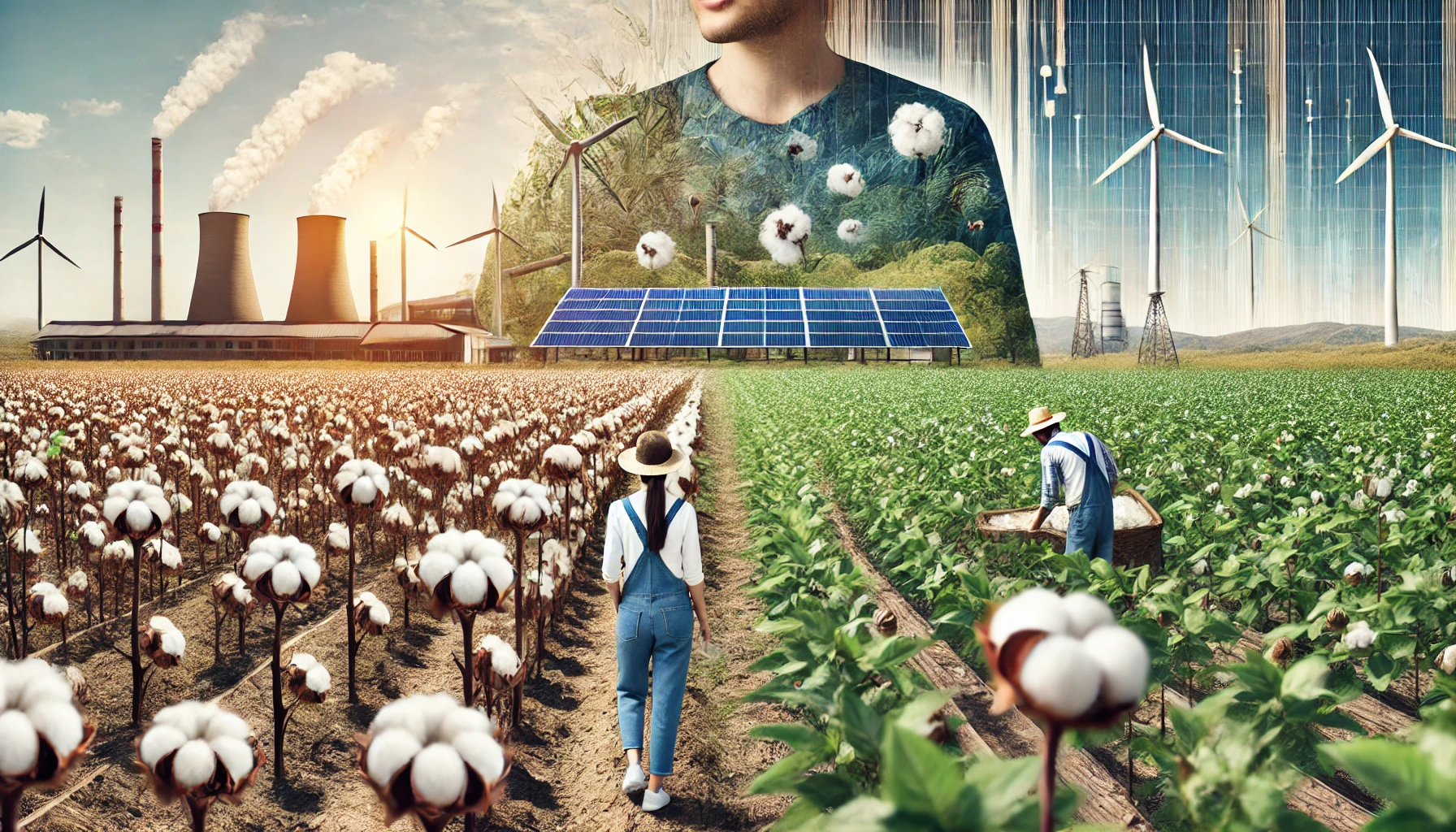
In recent years, the fashion industry has experienced a significant shift toward more sustainable and more ethical manufacturing practices. As consumers become more aware of the environmental and social impacts of their clothing choices, sustainable clothing manufacturers have emerged as key players in promoting eco-friendly, ethical production. These manufacturers are dedicated to reducing carbon emissions, conserving natural resources, and ensuring fair labor practices. In this article, we’ll explore everything you need to know about sustainable clothing manufacturers, from what makes them different from traditional manufacturers to how they’re shaping the future of fashion.
What Are Sustainable Clothing Manufacturers?
Definition and Core Principles
Sustainable clothing manufacturers are companies or factories that prioritize ethical clothing production and eco-friendly materials in their operations. Unlike conventional clothing manufacturers, which often focus solely on cost reduction and mass production, sustainable manufacturers adopt a more comprehensive approach to garment production. This includes:
-
Using sustainable materials: Such as organic cotton, hemp, bamboo, and recycled fabrics (like plastic bottles).
-
Reducing water and energy consumption: Sustainable manufacturers often implement modern technologies to reduce water consumption, use renewable energy, and lower overall energy usage in their factories.
-
Adopting ethical labor practices: Ensuring fair wages, safe working conditions, and the absence of child labor.
-
Minimizing waste: Through practices such as zero-waste production and circular economy initiatives.
By focusing custom manufacturing back on these key principles, sustainable clothing manufacturers aim to make a positive impact on both the environment and the people involved in the production process.
The Difference Between Sustainable and Conventional Clothing Manufacturers
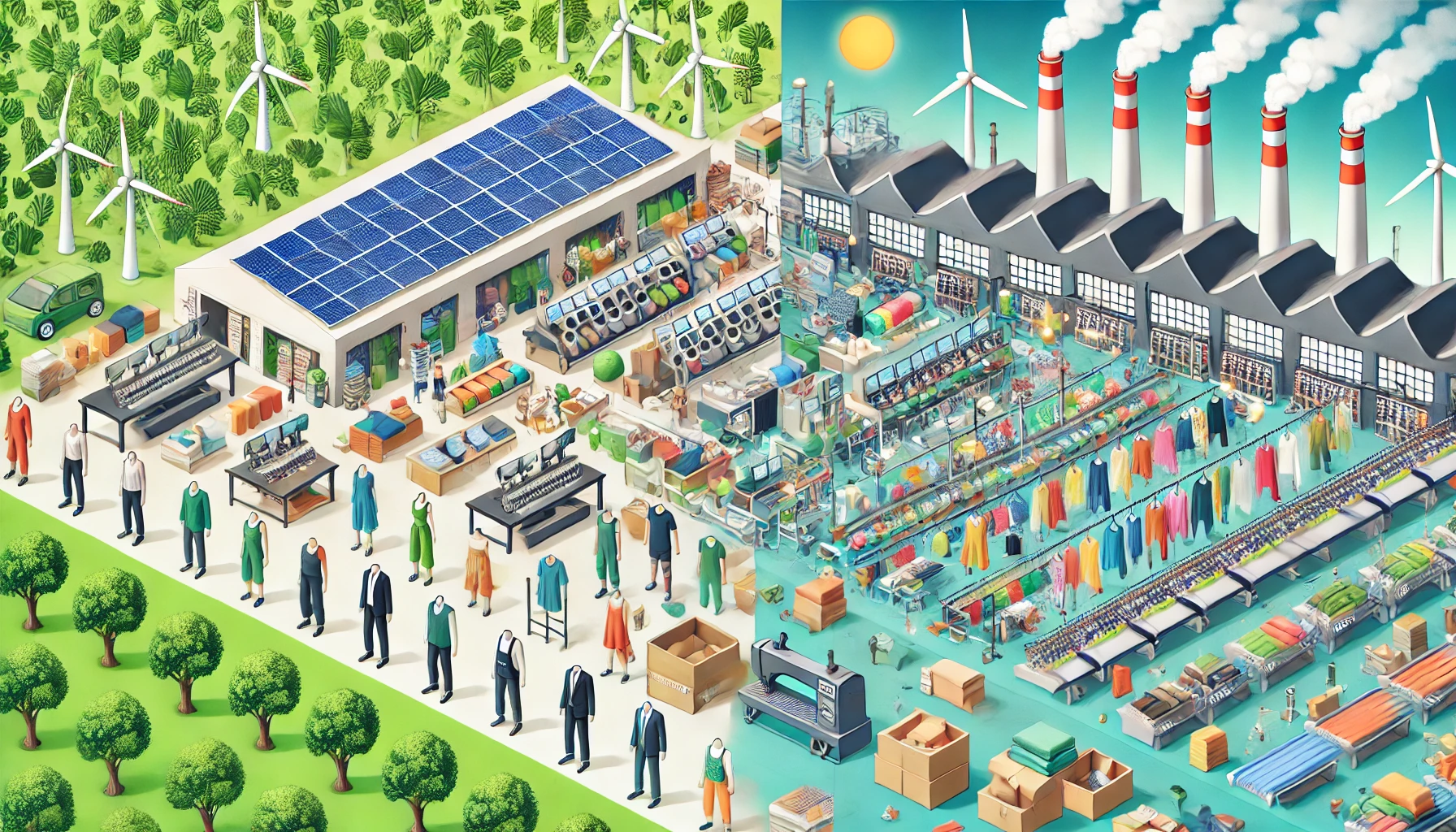
While conventional clothing manufacturing is known for its reliance on fast fashion and low-cost labor, sustainable clothing manufacturers take a more thoughtful approach. Here’s a breakdown of the key differences:
|
Aspect |
Conventional Manufacturers |
Sustainable Manufacturers |
|---|---|---|
|
Materials |
Use of synthetic, non-biodegradable materials (e.g., polyester, nylon) |
Use of organic materials, natural fibers, and recycled fabrics |
|
Water Usage |
High water consumption in dyeing and production processes |
Emphasis on less water usage, low-impact dyes, and water recycling systems |
|
Energy Consumption |
Heavy reliance on fossil fuels for production |
Use of renewable energy sources like solar and wind |
|
Labor Practices |
Often exploitative, with poor working conditions and low wages |
Focus on fair wages, ethical labor practices, and worker empowerment |
|
Environmental Impact |
High levels of pollution, waste, and carbon emissions |
Reduced carbon footprint through eco-friendly practices and waste minimization |
As more consumers demand sustainable solutions, manufacturers are shifting away from harmful production methods to adopt more ethical and eco-friendly processes.
Why Choose Sustainable Clothing Manufacturers?
Choosing sustainable clothing manufacturers not only supports ethical practices but also helps mitigate the environmental impact of the fashion industry. Let’s dive deeper into the reasons why partnering with or purchasing from these manufacturers is a crucial step toward a sustainable future.
Environmental Impact
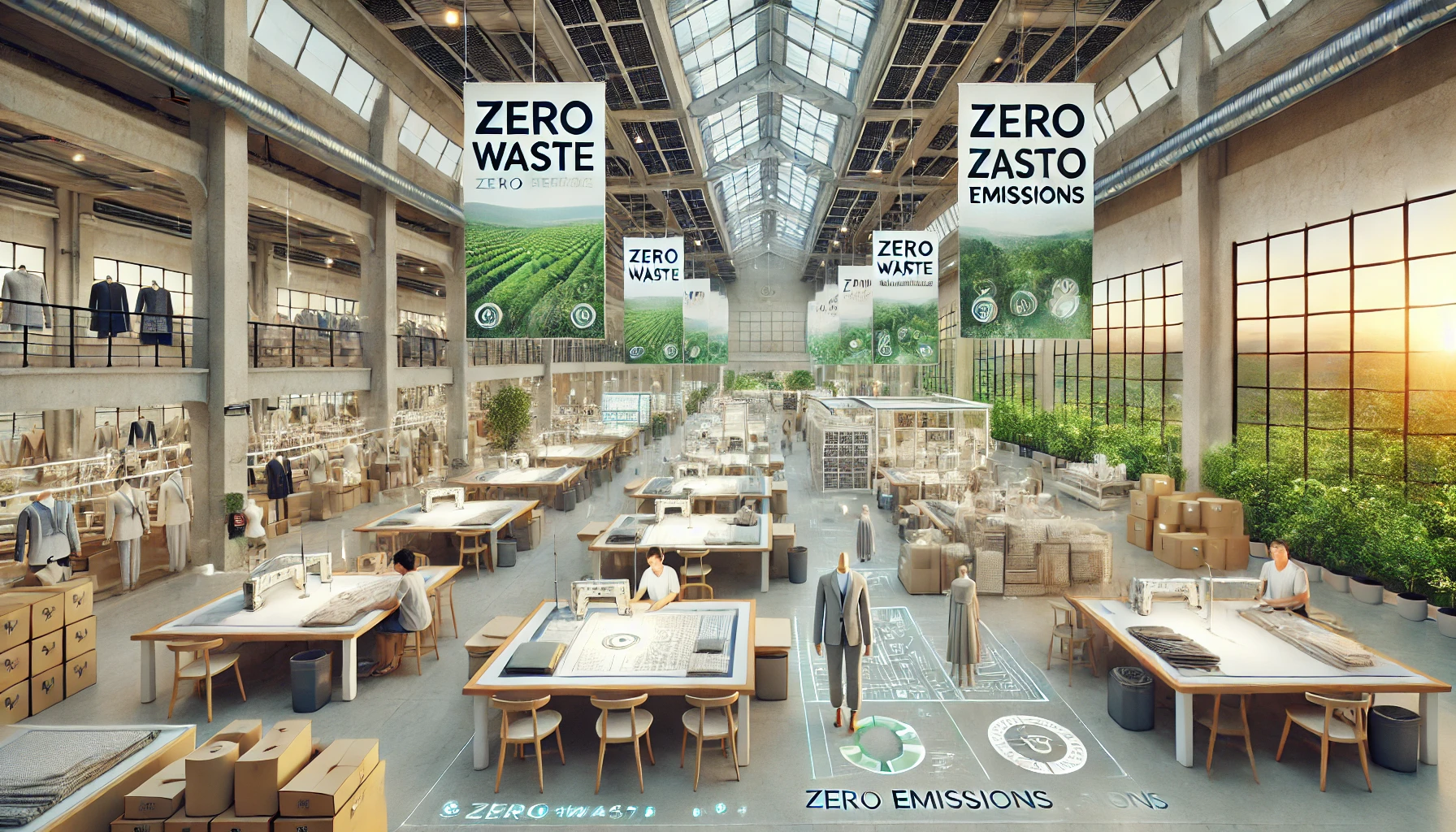
One of the biggest advantages of sustainable clothing manufacturers is their ability to reduce waste and pollution. Conventional fashion and garment manufacturing, is notorious for contributing to water pollution, emitting large amounts of carbon dioxide, and filling landfills with synthetic fibers that take hundreds of years to decompose. In contrast, sustainable clothing manufacturers take active steps to lessen their environmental responsibility:
-
Less water usage: Sustainable manufacturers use technologies that reduce water consumption by up to 90%. For example, the production of organic cotton uses far less water compared to conventional cotton farming.
-
Renewable energy: Many manufacturers power their facilities with solar or wind energy, helping to cut down on fossil fuel consumption.
-
Non-toxic chemicals: Sustainable brands use low-impact dyes and non-toxic chemicals, reducing water pollution and the release of hazardous substances.
Case Study: Brands like Eileen Fisher are leading the charge in sustainable fashion by using recycled fabrics, sourcing from organic clothing manufacturers, and implementing a “take-back” program to recycle old garments into new clothing.
Ethical Labor Practices

Another compelling reason to choose sustainable and ethical clothing manufacturers, is their dedication to fair labor practices. Many traditional manufacturers, especially in developing countries, are plagued by issues like child labor, unsafe working conditions, and unfair wages. In contrast, ethical manufacturers prioritize the well-being of their workers by:
-
Paying fair wages that align with or exceed living wage standards.
-
Providing a safe working environment where workers are treated with dignity.
-
Promoting social responsibility by supporting community development initiatives and offering workers educational opportunities.
Fair Trade Certification is one example of a standard that ensures sustainable clothing manufacturers uphold these ethical values.
Healthier for Consumers
Sustainable clothing manufacturers also consider the health and well-being of their consumers. By avoiding the use of harmful chemicals and synthetic materials in bulk production, they create garments that are safer for people to wear. Some advantages include:
-
Non-toxic dyes: Many eco-friendly clothing brands avoid toxic chemicals that are harmful to both the environment and human skin.
-
Organic fabrics: Organic cotton and other natural fibers used by sustainable manufacturers are grown without harmful pesticides, reducing the risk of skin irritation and allergies for consumers.
This focus on ethical production and healthy materials means that consumers can feel confident they’re wearing a quality clothing that’s good for both themselves and the planet.
Key Characteristics of Sustainable Clothing Manufacturers
Sustainable clothing manufacturers are defined by global presence and several key characteristics that set them apart from traditional apparel manufacturers. Let’s explore the main traits that make these companies leaders in eco-friendly fashion.
Eco-Friendly Materials
One of the most important aspects of sustainable clothing manufacturing is the use of eco-friendly materials. These materials are typically sourced in a way that minimizes environmental harm and promotes the responsible use of natural resources. Examples of sustainable fabrics include:
-
Organic Cotton: Grown without the use of synthetic pesticides or fertilizers, which reduces soil and water contamination.
-
Hemp: A fast-growing, renewable resource that requires less water than cotton and thrives without pesticides.
-
Recycled Polyester: Made from recycled plastic bottles, this fabric helps reduce plastic waste while providing a durable alternative to virgin polyester.
-
Bamboo: A highly sustainable plant that grows quickly and requires minimal resources.
By prioritizing these sustainable materials, manufacturers are reducing their reliance on environmentally harmful resources like synthetic fibers and petroleum-based materials.
Waste Reduction Practices
Sustainable clothing manufacturers are also committed to reducing waste throughout the entire production and manufacturing process. This involves:
-
Zero-waste design: Creating garments with patterns that utilize every piece of fabric, leaving little to no textile waste.
-
-
Upcycling and recycling: Repurposing old materials or garments into new products to extend their life cycle and minimize waste.
-
Circular economy initiatives: Implementing systems where garments can be returned, recycled, or repurposed at the end of their use, helping to close the loop on fashion production.
This focus on waste reduction aligns with the broader goals of the circular economy, which aims to keep materials in use for as long as possible, reducing the need for new raw materials and decreasing waste.
Energy-Efficient and Low-Impact Production
Sustainable clothing manufacturers are adopting innovative technologies to make their production processes more energy-efficient and environmentally friendly. Some of these efforts include:
-
Renewable energy: Using solar panels or wind turbines to power production facilities, thereby reducing carbon emissions and reliance on fossil fuels.
-
Low-impact dyes: Utilizing environmentally safe dyes that require less water and energy in the dyeing process.
-
Energy-efficient machines: Upgrading machinery to more efficient models that use less energy and reduce waste in production.
By focusing on energy consumption and eco-friendly practices, these manufacturers are helping to reduce the carbon footprint of the fashion industry.
Certifications and Standards for Sustainable Clothing Manufacturers
One of the most critical aspects of sustainable clothing manufacturing is certification. Certifications act as third-party validation to ensure that manufacturers are adhering to the highest standards in sustainable practices, which prioritize ethical practices, labor, and environmental responsibility. Consumers and businesses alike rely on these certifications to verify that their clothing comes from a truly sustainable source.
What Certifications Should You Look For?
Here are some of the most well-recognized certifications for sustainable clothing manufacturers:
-
Global Organic Textile Standard (GOTS): This is one of the leading certifications for textiles made from organic fibers. GOTS ensures that clothing is produced with respect for the environment and ethical labor practices. The certification covers everything from the harvesting of raw materials to the final product.
-
Fair Trade Certification: Fair Trade certification guarantees that the workers involved in the production process are paid fair wages, work in safe conditions, and are not subject to exploitation or child labor. It also ensures that environmental standards are met.
-
OEKO-TEX Standard 100: This certification tests textiles for harmful substances, ensuring that products are safe for human use. It’s especially useful for consumers concerned about toxic chemicals in their clothing.
-
Cradle to Cradle Certified: This certification focuses on a product’s life cycle, ensuring that materials are safe, reusable, and biodegradable. It promotes the circular economy, where products are designed with their entire lifecycle in mind.
-
B Corp Certification: A certification for companies that meet rigorous standards of social and environmental performance, transparency, and accountability. B Corps are businesses that balance profit with purpose, including many in the fashion industry.
These certifications help consumers identify companies that are committed to ethical and sustainable practices, and hold manufacturers accountable for their environmental and social impact.
How to Verify If a Manufacturer Is Truly Sustainable
Unfortunately, the rise in demand for sustainable fashion has also led to an increase in greenwashing—when brands falsely claim to be environmentally friendly without actually adopting sustainable practices. To ensure that a manufacturer is genuinely sustainable, it’s essential to verify their claims through recognized certifications and independent audits.
Here are some tips for identifying whether a manufacturer is truly sustainable:
-
Check for Certifications: Look for the certifications mentioned above (GOTS, Fair Trade, etc.) on their website or product tags.
-
Request Transparency: Ask for detailed information on their supply chain, materials sourcing, and production processes. A truly sustainable manufacturer will be transparent about where and how their products are made.
-
Use Tools and Platforms: Tools like the Good On You app or the Fashion Revolution Transparency Index can help assess whether a manufacturer meets high standards for sustainability and ethics.
Top Sustainable Clothing Manufacturers Globally

As sustainability becomes a core priority for many brands, some sustainable clothing manufacturers have emerged as leaders in this space. Below, we highlight some of the top sustainable brands and manufacturers that are making a significant impact in the fashion industry.
Leading Sustainable Manufacturers
-
Patagonia: Known for its commitment to environmental responsibility, Patagonia has been a leader in sustainable fashion for decades. The company uses a significant amount of recycled materials, encourages customers to repair old garments, and is deeply involved in activism for environmental causes.
-
Eileen Fisher: This brand is renowned for its efforts to create a circular economy through its “Renew” and “Waste No More” programs. Eileen Fisher focuses on organic materials and ethical production processes, ensuring that both the environment and workers are treated with respect.
-
People Tree: A pioneer in Fair Trade and sustainable fashion, People Tree partners with artisans and farmers in developing countries to create eco-friendly garments. Their collections are made from organic cotton, and they employ low-impact dyes and hand weaving techniques that minimize energy consumption.
Regional Examples of Sustainable Clothing Manufacturers
Across the globe, different regions have developed their own ecosystems of sustainable manufacturers local manufacturing, driven by local resources and environmental priorities. Here are a few examples:
-
North America: Brands like Royal Apparel in the United States specialize in private label manufacturing for sustainable brands, using organic materials and maintaining strict labor standards.
-
Europe: In the UK, Stella McCartney has been a key player in pushing for cruelty-free, eco-friendly fashion. The brand uses sustainable fabrics like organic cotton and recycled materials in its high-fashion designs.
-
Asia-Pacific: While traditionally a hub for fast fashion, the region is seeing a rise in sustainable manufacturers. Thygesen Textile Vietnam, for example, focuses on providing eco-friendly materials and ethical production for global brands.
Startups and Emerging Players in Sustainable Fashion
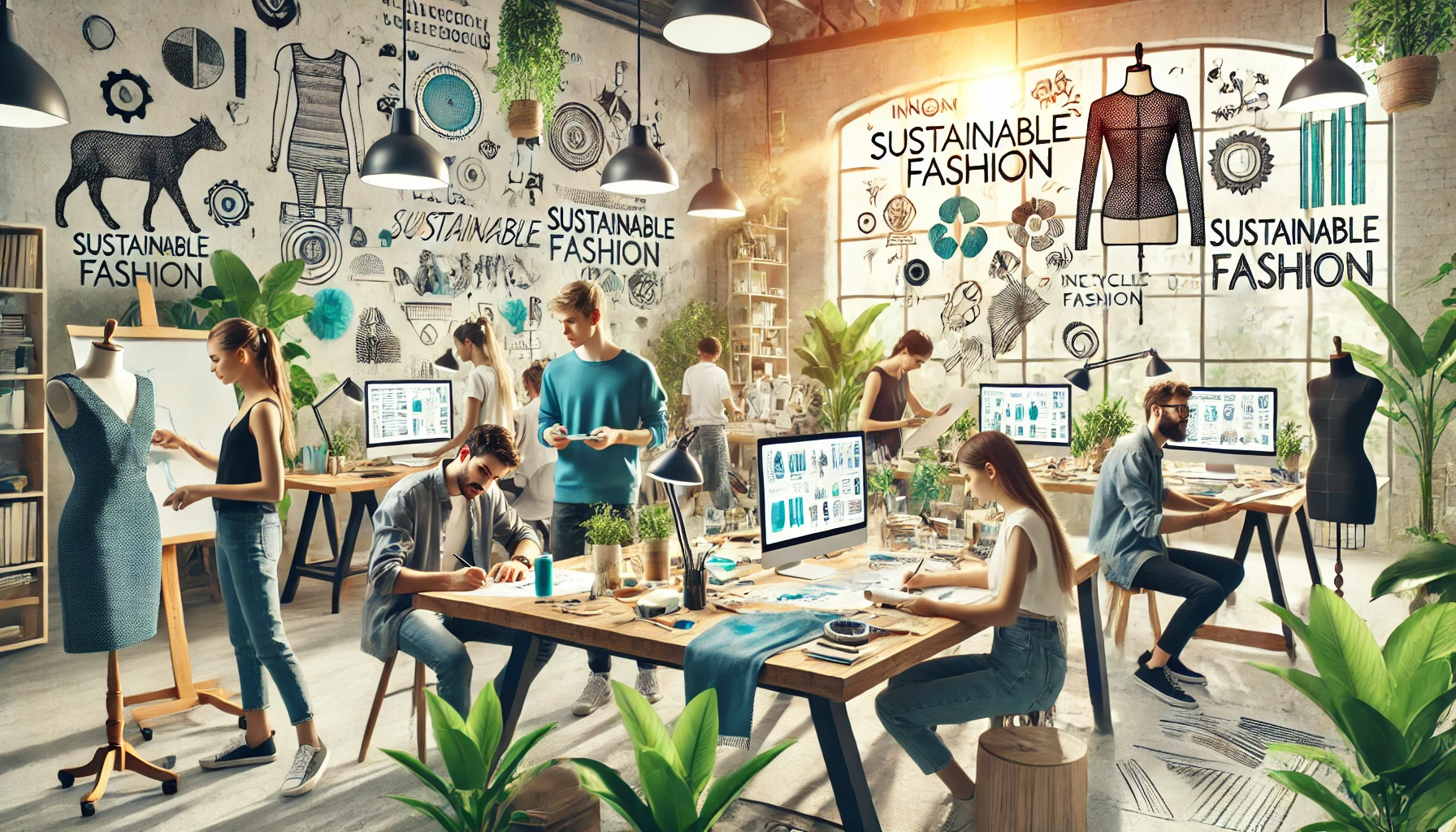
In addition to established luxury brands, innovative startups are also making waves in the sustainable fashion industry. Many of these companies are embracing modern technology and innovative solutions to create sustainable clothing at a reasonable price. Some noteworthy startups include:
-
Allbirds: Known for their eco-friendly shoes, Allbirds uses renewable materials like merino wool and eucalyptus in their products. Their carbon emissions are offset through investments in clean energy projects.
-
Pangaia: A materials science company and sustainable fashion brand, Pangaia focuses on using recycled fibers, bio-based materials, and natural dyes to create casual wear with a minimal environmental impact.
These emerging brands are pushing the boundaries of what’s possible in sustainable fashion, combining innovation with a deep commitment to sustainability.
How to Choose a Sustainable Clothing Manufacturer as a Brand or Business
If you’re a business looking to transition to or partner with a sustainable clothing manufacturer, there are several key factors to consider. The choice of manufacturer can significantly impact not only your brand’s values but also your ability to meet consumer demand for sustainable solutions.
Factors to Consider When Partnering with a Manufacturer
When selecting a sustainable clothing manufacturer, it’s important to assess and quality control several aspects of their operation:
-
Material Sourcing: Ensure that the manufacturer sources sustainable fabrics like organic cotton, hemp, or recycled materials. Certifications like GOTS can guarantee the integrity of their sourcing practices.
-
Production Capacity and Scalability: Make sure the manufacturer can meet your business needs in terms of production volume while still maintaining sustainable and ethical practices.
-
Ethical Labor Standards: Verify that the manufacturer adheres to fair wages, safe working conditions, and social responsibility standards. Request transparency in their labor practices.
-
Proximity and Location: The closer the manufacturer is to your primary market, the lower the carbon footprint from shipping and transportation. Local production is often more sustainable than importing from distant locations.
Questions to Ask a Sustainable Manufacturer
Before entering into a partnership, ask potential manufacturers the following questions to ensure their sustainability practices align with your brand’s values:
-
What materials do you use, and where do they come from? Ensure they are sourcing eco-friendly and organic materials with verified certifications.
-
How do you handle waste and excess materials? A responsible manufacturer will have processes in place for recycling, upcycling, or minimizing waste.
-
What are your labor policies? Ask about their policies regarding wages, working hours, and worker safety.
-
What certifications do you hold? Make sure they have reputable certifications like Fair Trade, GOTS, or OEKO-TEX.
Conclusion
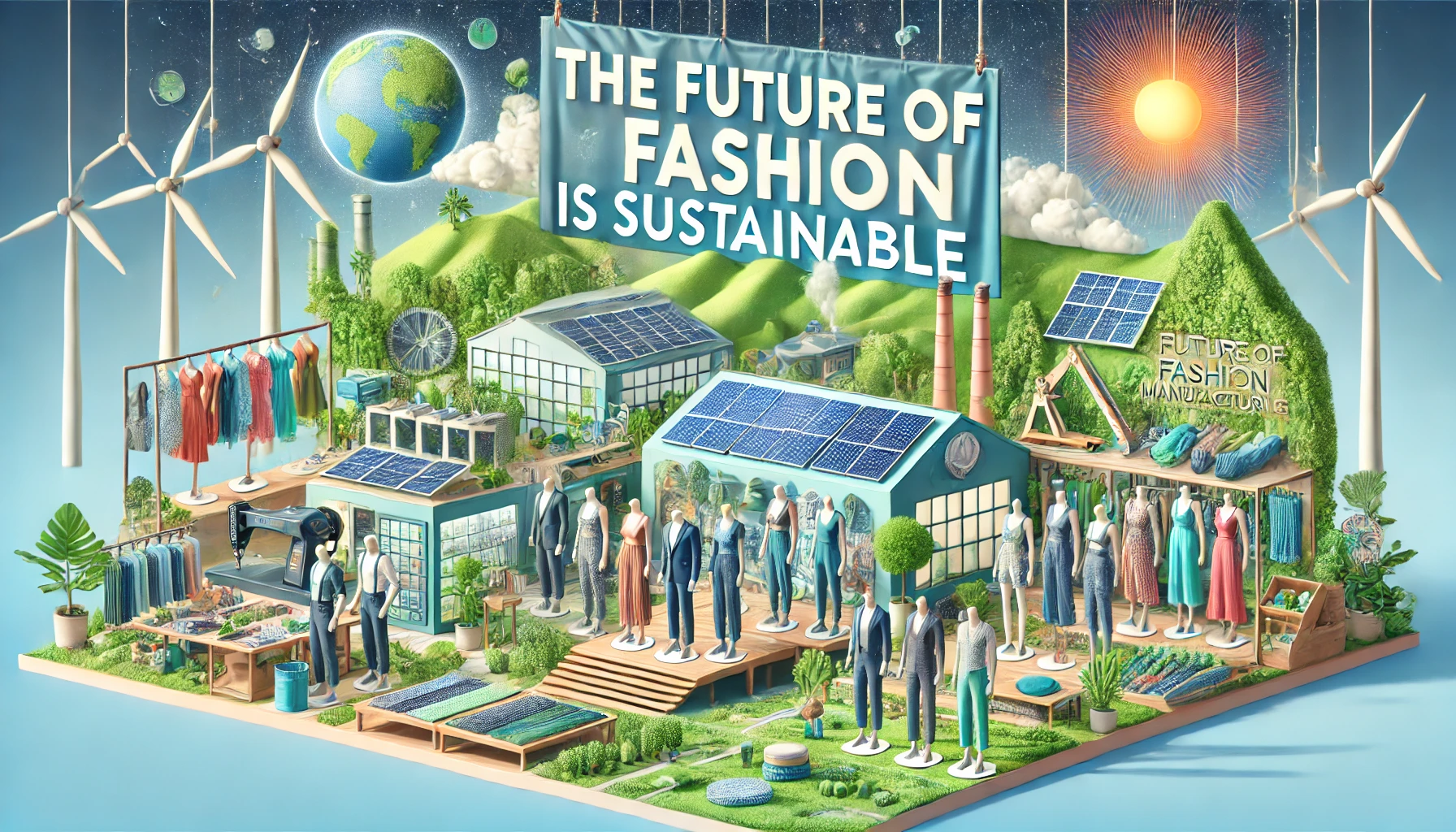
Sustainable clothing manufacturers are playing an increasingly important role in transforming the fashion industry into one that values both environmental responsibility and social ethics. As consumer demand for alternative apparel shifts towards more conscious choices, these manufacturers are leading the way by adopting sustainable practices, from using eco-friendly materials like organic cotton and recycled fibers to implementing energy-efficient production processes that significantly reduce carbon emissions. By prioritizing ethical labor practices and reducing water consumption, they are setting new standards for what it means to be truly sustainable brands in the modern era.
Partnering with or purchasing from sustainable clothing manufacturers not only helps reduce the negative impact of fashion on the planet but also supports fair wages and safe working environments for garment workers around the world. This conscious decision creates a ripple effect throughout the global supply chains, promoting a more circular economy where resources are reused, and waste is minimized.
As businesses look to align eco conscious practices with sustainable fashion manufacturing, the future holds endless potential for innovation and positive change. From the rise of recycled materials to breakthroughs in energy consumption and low-impact dyes, the industry is making strides toward a greener, more responsible future.
Whether you are a business exploring ethical partnerships or a consumer looking to make more environmentally friendly choices, supporting sustainable clothing manufacturers is a powerful step toward a more sustainable future for all. The choices we make today will not only impact our own lives but also shape the future of fashion for generations to come.
